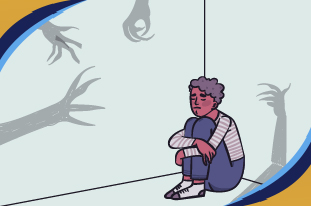Both bipolar and schizophrenia are long-term mental disorders that can affect the minds of anyone at any age, but they are most commonly observed in adults in the USA between late teens to 30 years.
Though bipolar disorder is more common, and on the other hand schizophrenia symptoms are more severe. The patient feels hallucinations, a disconnection from reality. In contrast, bipolar disorder is a shift between moods and energy from extreme excitement (mania) to depression.
Not everyone with schizophrenia symptoms can experience hallucinations, but it is common.
There is also some overlap in symptoms, so people can make mistakes between bipolar or schizophrenia. However, these two have similar risk factors and can be developed at the same age of life. These conditions can be genetic, while environmental factors can also be their causes or triggers.
Early diagnosis of bipolar vs schizophrenia is necessary. Ensure to speak to a healthcare professional or psychiatrist if you or your loved ones have one or both of these mental illnesses. This is necessary to know whether it is bipolar or schizophrenia. Their planned and proper handling can help you manage either of these conditions and bring you a positive life.
What Are The Major Differences Between Bipolar and Schizophrenia?
Bipolar disorder is characterized by significant shifts in physical energy, mood, and activities. A person with bipolar disorder can experience shifts from extreme changes (mania and depression).
However, the main feature of schizophrenia is psychosis, which consists of a disconnection from reality while experiencing hallucinations and delusions.

Hallucinations are a symptom of schizophrenia, where you can hear, see, and feel things that are not actually present.
Delusions are unshakable beliefs that are essentially untrue.
In the case of bipolar disorder, individuals can experience psychosis during mood episodes, but this is not a defining characteristic of the condition. Moreover, psychosis in bipolar disorder is less severe than it is found in schizophrenia.
Read More: Schizophrenia in Children: Causes, Symptoms, and Treatment
What is Schizoaffective Disorder, Bipolar Type?
This mental condition combines the symptoms of bipolar disorder and schizophrenia. It includes schizophrenia, primarily psychosis (like hallucinations or delusions), alongside mood shifts (bipolar disorder).
The Diagnostic and Statistical Manual of Mental Disorders (DSM-5-TR) provides specific criteria. The key aspect is the timing and persistence of symptoms. There are differences between schizophrenia and bipolar disorder.
Concurrent Symptoms:
There are periods when a major mood episode (mania or depression) occurs at the same time as the core signs of schizophrenia (delusions, hallucinations, disorganized speech, etc.).
Independent Psychosis:
A person must experience delusions or hallucinations for at least two weeks without any major mood episodes occurring during the duration of their illness. This criterion helps differentiate it from bipolar disorder, where psychotic symptoms usually occur only during significant mood episodes.
Rule Outs:
The use of a substance or another medical condition cannot explain the symptoms.
There are two main subtypes:
- Bipolar Type: This type involves whether manic episodes are part of the condition. Major depressive episodes are also common in this type. This is the focus of this article.
- Depressive Type: This applies only if major depressive episodes occur with the schizophrenia symptoms.
Read More: Causes of Schizophrenia: Is Schizophrenia Genetic?
Symptoms Of Schizophrenia And Bipolar Disorder
- Manic Episodes: Distinct periods of abnormally elevated, expansive, or irritable mood and persistently increased energy or activity, lasting at least one week (or any duration if hospitalization is needed). Symptoms include:
- Inflated self-esteem or grandiosity.
- Decreased need for sleep (feeling rested after only a few hours).
- Increased talkativeness or pressure to keep talking.
- Racing thoughts or flight of ideas.
- Distractibility.
- Increased goal-directed activity (socially, at work, or sexually) or psychomotor agitation.
- Major Depressive Episodes: This period lasts for two weeks of depression or loss of interest in activities, plus other symptoms like:
- Considerable weight loss or gain, or a decrease/increase in appetite.
- Insomnia or hypersomnia (sleeping too much).
- Fatigue or loss of energy.
- Feelings of worthlessness or extreme guilt.
- Lost the ability to think, focus, or make decisions.
- Recurrent thoughts of death, suicidal ideation, or suicide attempt.
The experience is highly individualistic, with symptom severity and combination varying over time. However, there is a general question of whether bipolar disorder can turn into schizophrenia. The answer is no, and we will learn about it in this blog.
Read More: Understanding Borderline Schizophrenia: Symptoms, Causes and Treatment
Why Does It Happen? (Finding Causes)
The full and final cause of schizoaffective disorder remains unidentified, but research suggests a complex part of several factors:
- Genetics: Family history plays a role. If the person’s close relative is experiencing schizophrenia, bipolar disorder, or schizoaffective disorder, the risk increases. However, genetics alone does not define the problem; many people with a family history never develop these conditions.
- Brain Chemistry and Structure: Imbalances in neurotransmitters( brain chemicals like dopamine and serotonin determine mood and perception) are thought to contribute to this condition. Though research is ongoing, differences in brain structure or function might also be involved.
- Environmental Factors: Major life incidents can influence risk, such as a person’s exposure to viruses or malnutrition before birth, complications during delivery, or significant childhood trauma (like abuse or neglect) can increase exposure.
- Stress: Stressful life events often act as triggers for symptom onset or relapse. The stress vulnerability suggests that people can develop the disorder when they have to face significant life stress (like job loss, relationship breakdown, bereavement, or traumatic experiences). Up to two-thirds of people with psychotic disorders report experiencing trauma.
- Substance Use: The use of psychoactive drugs, especially during teenage and adult years, can increase the risk or trigger psychotic/ mood episodes in weak individuals.
Read More: A Guide To Understand Catatonic Schizophrenia
Getting an Accurate Diagnosis
Because symptoms overlap with both schizophrenia and bipolar disorder, diagnosing schizoaffective disorder requires a thorough examination by expert mental health professionals, such as psychiatrists. The treatment normally involves:
- Detailed Interview: Here, they can discuss current symptoms, personal and family mental health history, and the duration of mood and psychotic symptoms.
- Physical Examination: This is necessary to rule out medical conditions that could cause similar symptoms.
- Ruling out Other Factors: Check for prescribed medicine that can simulate or trigger symptoms.
- Observation Over Time: Sometimes, a clear diagnosis emerges only after observing the pattern of symptoms over several months or longer. It takes time.
A complete diagnosis is important for making an effective treatment plan.
Read More: Trauma Brain Vs Normal Brain: How Trauma Affects The Way We Live
Finding Stability and Hope As A Solution
Although schizoaffective disorder is typically a lifelong condition, it can be treated. Patients can improve their lives, decrease symptoms, and follow meaningful goals with continuous management. Treatment usually applies a combination of approaches:
Medication:
This is often the basic treatment.
- Antipsychotics: These medications help manage psychotic symptoms like hallucinations and delusions. Paliperidone (Invega) is the only medication specifically FDA-approved for schizoaffective disorder, but doctors often prescribe other effective antipsychotics (e.g., risperidone, olanzapine, aripiprazole, quetiapine).
- Mood Stabilizers: For the bipolar type, mood stabilizers (like lithium, valproic acid, carbamazepine, and lamotrigine) are essential to control manic episodes and help prevent future mood swings.
- Antidepressants: If depressive episodes are significant, an antidepressant can be taken. Well, these should be used cautiously and with a mood stabilizer or antipsychotic due to the potential risk of activating mania in patients.
Key Point: Finding the right medication or combination often takes time and collaboration with a psychiatrist. Consistent adherence is crucial for effectiveness.
Psychotherapy (Talk Therapy):
Therapy provides skills and support to manage the illness.
- Personal Therapy: Cognitive Behavioral Therapy (CBT) is often helpful. It gives solutions to individuals to identify and control irrelevant thought patterns related to both psychosis and mood, to manage stress.
- Family Therapy/Education: This management involves family members who can improve communication, reduce household stress, enhance understanding of the illness, and build a stronger support network for the patient.
- Social Skills Training: This helps improve communication and interpersonal skills, which can be affected by the illness, and helps to reduce social isolation.
- Arts Therapies: A person’s interaction with creative sessions (such as art, music, and drama) can elevate mood by allowing that patient to express feelings to others and enjoy themselves.
Read More: How to Help Someone With Bipolar Disorder?
Bipolar schizophrenia is a complex condition that demands proper diagnosis and comprehensive, ongoing treatment. It connects the worlds of psychosis and significant mood fluctuation, which present unique challenges. However, through a combination of medication, physical therapy, lifestyle change, stress management, and strong support systems, individuals can manage symptoms effectively. This way, they can reduce the impact of illness on their lives and work towards a better future. If you or someone you know is struggling with these symptoms, finding a mental health professional is a necessary step toward getting help and finding hope.
However, experts are available at Orange Coast Psychiatry who can help you alleviate the symptoms and make life normal like before. Contact them at any time and make life worth living.

























